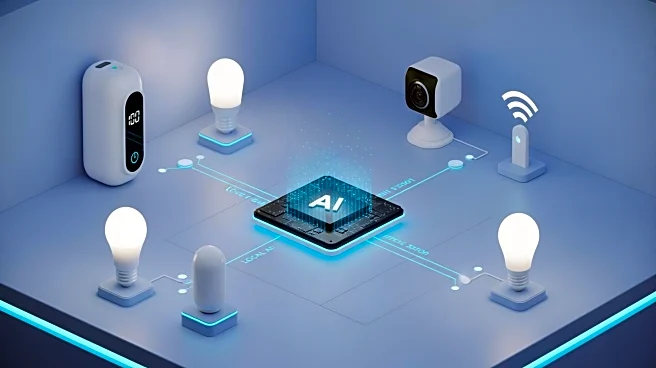What's Happening?
Arm Holdings CEO Rene Haas has proposed a shift in AI workload management to improve sustainability. In an interview with CNBC's Jim Cramer, Haas emphasized the need to move certain AI functions away from cloud-based systems to reduce energy consumption.
He highlighted that while AI training will continue in the cloud, AI inference can be executed locally on devices such as phones, computers, and glasses. This approach, according to Haas, aligns with historical trends towards hybrid computing models, which could mitigate the extensive power demands of large data centers. Arm Holdings, a key player in semiconductor technology, is expanding its partnership with Meta to enhance AI efficiency across software and data center infrastructure. This collaboration is expected to scale AI capabilities and improve energy efficiency.
Why It's Important?
The shift towards local AI workload management has significant implications for energy consumption and sustainability in the tech industry. By reducing reliance on cloud-based systems, companies can lower their energy usage, which is crucial as data centers become increasingly power-intensive. This move could lead to cost savings and environmental benefits, aligning with global efforts to reduce carbon footprints. Arm Holdings' partnership with Meta further underscores the importance of efficient AI processing, potentially setting a precedent for other tech companies. The collaboration could drive innovation in AI technology, making it more accessible and sustainable, benefiting both consumers and the environment.
What's Next?
Arm Holdings and Meta's expanded partnership is likely to influence future developments in AI technology and infrastructure. As they work to scale AI efficiency, other tech companies may follow suit, adopting similar strategies to enhance sustainability. This could lead to increased investment in local processing technologies and hybrid computing models. Stakeholders, including tech companies and environmental groups, will be watching closely to assess the impact of these changes on energy consumption and sustainability. The success of this initiative could prompt further collaborations and innovations in the tech industry, driving progress towards more sustainable practices.
Beyond the Headlines
The move towards local AI processing raises questions about data privacy and security. As AI functions shift from cloud to local devices, companies must ensure robust security measures to protect user data. Additionally, this trend could influence the design and functionality of consumer electronics, as devices become more capable of handling complex AI tasks independently. The ethical implications of AI technology, including its impact on employment and societal norms, will continue to be a topic of discussion as these technologies evolve.
















